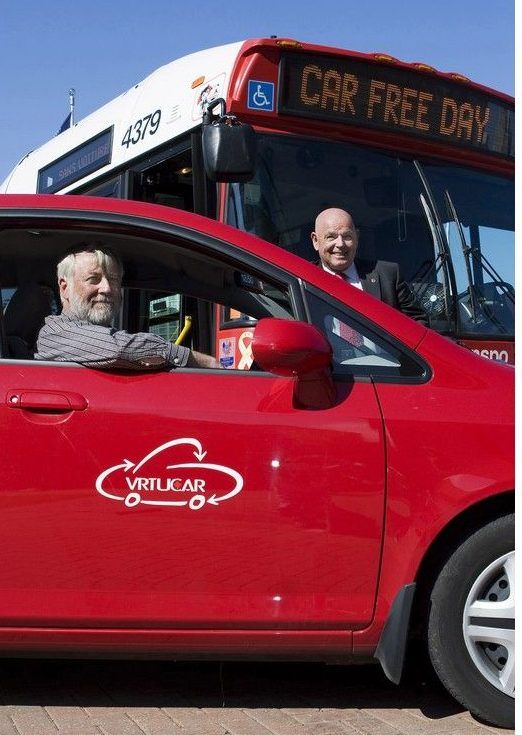
When Annaelle Catherine got a job at a food-services firm in Nepean a few years ago, she was confronted with
the difficult problem
of
how to get to work
each morning.
From her home in Old Ottawa South, the OC Transpo
commute
clocked in at around an hour and 20 minutes — too long, too gruelling.
Purchasing a vehicle was out of the question, too: these were pandemic days, and cars — especially used cars — were expensive.
So to make things work, Catherine in the end turned to Communauto.
The car-sharing company’s dedicated parking spots were steps from her home, which was good. But Catherine found herself booking those cars for her entire workday — around 10 hours — which felt like it wasn’t in the spirit of “car sharing”.
“The car would be sitting in a parking lot, which is not great, because somebody else could have been using it,” says Catherine, who is 32 and whose job involves drafting plans for commercial kitchens around North America. Despite her heavy use of the service, which ranged from two to five workday-length bookings a week, it was cheaper than car ownership: about $350 a month.
Since those days, a relatively far-flung romantic attachment has led Catherine to break down and buy a vehicle, but she nevertheless describes herself somewhat ruefully as “bitter” to learn that Communauto is introducing the FLEX program to Ottawa and Gatineau only now that she’s a car owner.
That new service, set to begin as early as this month — an exact date hasn’t been announced — lets users pick up FLEX vehicles at short notice in one on-street parking location, then end the trip at another. Members find cars and manage their bookings through Communauto’s mobile app. Until now, Ottawa-Gatineau has only been offered Communauto’s regular, station-based service, which requires that a car be booked in advance and returned to a dedicated home spot.
So with the arrival of FLEX, could Nepean-bound Catherine have avoided those anxiety-making thoughts of her unused rental languishing without her in that office parking lot?
Actually, no — at least not yet. And especially not in Nepean.
Communauto is introducing its FLEX scheme in collaboration with the municipalities of Ottawa and Gatineau as part of a relatively small pilot project that will continue until the end of Spring 2026. The service areas within which the company’s first 30 FLEX vehicles can park in residential permit zones will be limited during this test period to a modest swath of Centretown, much of Sandy Hill and the Glebe, and the entirety of Hull on the Quebec side.
So, no Val-Tétreau, no Hintonburg, no Lowertown.
“To include Westboro and Vanier and Alta Vista would seem pretty basic,” says Peter Margolis, a 37-year-old federal public servant who lives in Centretown and who has used Communauto FLEX in Montreal, where the FLEX service area covers much of the city, as well as a similar service in Washington, D.C. “It’s an initial program, I don’t want to be so negative. But I am sceptical.”
Such scepticism stems principally from concerns that Communauto’s initial FLEX zones cover parts of Ottawa-Gatineau that are already walkable and well served by public transit and bike paths.
Will there be demand for a one-way car-sharing plan that is a lot more expensive than those options, as well as being more expensive than Communauto’s regular round-trip plan? (Even if it is markedly less expensive than taxis and other ride-hailing services available in Ottawa.)
Such questions underscore the challenges associated with operating car-sharing businesses, and of managing the cities where such businesses are most likely to succeed in a manner that keeps everybody — including those residents who themselves own and regularly use cars — happy.
The list of companies that have tried and failed is long.
In Toronto, Car2go, a car-sharing company that offered a one-way service much like Communauto’s FLEX and claimed to have 80,000 users in the city, exited in 2018 after complaining of onerous parking restrictions and high permit fees; it later left the North American market altogether.
Zipcar, the world’s largest car-sharing company, launched its service in Ottawa in 2015, but quietly withdrew in 2020 when the COVID-19 pandemic dampened demand.
Vrtucar, an Ottawa company that launched small in the Glebe 25 years ago, has operated under Communauto’s banner since being sold to it in 2016.
“It’s a difficult market because it’s a very capital intensive business with very small margins,” says Marco Viviani, VP of strategic development at Communauto. “You can be profitable, but you have to find your motivation in something else other than just the commercial part of it. And this is the reason why many companies left the market.”
Founded in Quebec in 1994, Communauto is “a mission-driven company,” says Viviani. “Of course we want to be sustainable, economically, that means we have to balance cost and revenues. But our main goal is to provide a service that replaces cars or that allows people to mix all the transportation and mobility options available.”
It is by all accounts growing. With almost 8,000 vehicles, it is the largest car-sharing company in Canada, with fleets in Alberta, Nova Scotia, Ontario and Quebec (along with an outpost in Paris, France). It is also the last remaining major player in North America to offer a free-floating car-sharing service — Ottawa and Gatineau were the last of the company’s markets in this country to get access to FLEX.
Other cities that have welcomed “free-floating” services like Communauto’s via special parking arrangements cite as reasons for doing so the promise of cheaper transport costs for households and lower greenhouse-gas emissions.
“We’d love to say, ‘Well, I’ll bring a set of furniture on the bus,’ but the reality is it’s probably not going to happen,” says Beacon Hill-Cyrville Coun. Tim Tierney, chair of the Public Works and Infrastructure Committee, formerly called the Transportation Committee. “People having that option to say, ‘I’m not going to go buy a car, I’m just going to use one on demand,’ I always encourage — especially if it doesn’t cost us any money as taxpayers.”
According to a fact sheet published by Communauto, users can end FLEX trips within the Ottawa-Gatineau service zones “wherever parking is permitted and no meter is required. FLEX cars have parking privileges, allowing users to park overnight and in areas with time limits, similar to Ottawa resident permit holders.” This no free for all: clients must respect parking rules and posted signs, and will be ticketed (Communauto passes on fines) if they’re not careful.
The free-floating model’s arrival elsewhere has not gone without friction. In Toronto in 2019, prompted complaints when residents of Bloor West Village found that FLEX cars were monopolizing neighbourhood parking.
“Some of these Communauto FLEX cars take up a place 24 hours a day for more than a week between rentals, while residents and our visitors scramble for the few spots available,” one reader wrote the Toronto Star at the time. “Some sat covered in snow and plowed-in for days.”

Somerset Coun. Ariel Troster, who sits on the Public Works and Infrastructure Committee, holds no truck with such fustiness: “The city owns the road, streets are for everyone, a parking spot that happens to be on a city road isn’t your personal property,” she says. “People adjust!”
Matti Siemiatycki, an expert on how cities work, says such conflicts over parking reflect a deeper anxiety around how public spaces are shared and who gets to profit from them.
“Anything to do with parking is a hot-button issue,” says Siemiatycki, director of the Infrastructure Institute and a professor of geography and planning at the University of Toronto. “This one is so interesting because you’re balancing the private versus the collective automobile model, and on the other you’re balancing the role of the firm versus individuals who are also struggling and competing over the same parking spots.”
Also being balanced, in the case of the Ottawa-Gatineau pilot project, are the quirks and administrative requirements of two municipalities located in two different provinces.
Bridging the demands of Ottawa and Gatineau required some creative maneuvering from Communauto, largely because any one of its 30 FLEX cars could at any one time be driving or parked in either jurisdiction — the car-share equivalent of Schrödinger’s cat. Therefore, 15 of the cars have been registered in Quebec, 15 in Ontario. For the purposes of the pilot project, Communauto will pay annual parking-permit fees to both cities for each one of its FLEX cars, $956 for Ottawa permitting, $279 in total for Gatineau (covering the commercial parking rate and a winter fee).
Details such as these were still being ironed out as recently as last week, and Viviani is hopeful the FLEX program servicing the two cities will get running soon. The complexities around servicing two different municipalities in two different provinces with the same fleet might have caused other companies to walk away; that Communauto stuck to it despite the uncertain business returns appears to support Viviani’s boast about the company being “mission-driven.” But if that was trouble, believe this — there is more coming.
“Winter will be the test and why it will remain a pilot until that information is collected,” says Tierney, Ottawa’s transportation chair, citing the issue of snow clearance. “Every municipality has different rules when it comes to on-street parking during snow conditions and special weather events. Some people just don’t remember.”
The city of Gatineau said active FLEX users would be responsible for moving cars during snow-clearing operations and that company staff would move the remainder parked between bookings.
Boosters of the program such as Benoit Delage, executive director of the Outaouais Regional Council for the Environment and Sustainable Development, say car-sharing is a “no brainer” not just because it helps get cars off the road and reduces greenhouse-gas emissions, but because it allows developers and municipalities to build housing with fewer parking spaces per household.
“Studies tell us the price of a parking space is around 10 per cent of the price of a unit — 10 per cent!” says Delage. “So when we’re talking about making sure we build cheaper to get people more access to housing, parking is a big expense.”
Delage, who participated in the talks between Gatineau, Ottawa and Communauto as they hammered out the pilot project, cites an upcoming development in Chelsea, Que. where rather than a second parking spot per unit the developer has agreed to help pay for car-sharing stations instead, resulting in 200 fewer parking spaces along a one-kilometre stretch of road. Delage says one car-share vehicle answers the needs of 10 families.
Ultimately, says Delage, it’s serving the mobility needs of residents at an affordable price that’s going to move the needle: “Communauto is working ultimately because — you know why? — it’s not because people are doing that for the environment or blah blah blah. It’s because they save money!”
Which is good. But when it comes to frequent car-share use, Annaelle Catherine, the kitchen planner from Old Ottawa South, also remembers… the bad. “Sometimes people forget their food in the car and it smells bad,” she says. “Like a sandwich. Like a full meal. Or their drinks.
“The cars, they were not in great shape. Unfortunately. Dents. Lack of respect for the car overall,” she adds, rueful again. “You know — it’s not your car. And you have to bring it back somewhere. So you can’t leave anything in it. And then sometimes when you want to have a car, there’s no car available. That can be annoying too.
There is also the dog hair, or evidence that a dog jumped into the backseat covered in the residue of a rainy day at the park. “Like, I love dogs,” Catherine says, “but you’re sharing a car.”
Our website is your destination for up-to-the-minute news, so make sure to bookmark our homepage and sign up for our newsletters so we can keep you informed.
Related
- Deachman: How did Ottawa drivers get to be so horrible?
- OC Transpo misses on-time targets — again. Now what?



